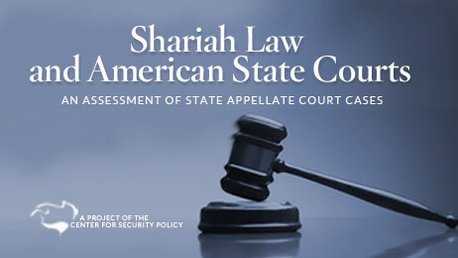Shariah Law and American State Courts: An Assessment of State Appellate Court Cases
This study evaluates published appellate legal cases that involved “conflict of law” issues between Shariah (Islamic law) and American state law.

Future Directions
Google Scholar, the open source database used to identify published cases, is not a complete data base of state cases involving Shariah because as a search tool it allows retrieval only of those reported appellate and trial court level cases that are available through open sources. Google Scholar explicitly does not include within its knowledge bases those judicial opinions not published, decisions rendered by order and not by opinion, and those cases settled or terminated prior to a judicial opinion. Google Scholar will also not retrieve jury verdicts that are not otherwise challenged and ruled upon by the court. Consequently, the reported cases represent only a small sampling of the total cases that likely involve Shariah in the courts. Therefore, one area for future research should assess a more comprehensive sample, possibly resulting in a larger and more varied set of findings of types of conflict of law presented by Shariah in U.S. state courts.
Second, a similar assessment should be done using U.S. federal legal cases (this study looks only at cases from courts in the the 50 states) as the study sample, using either the Google Scholar small sample of Appellate Court cases, or a larger one including a broader set of Trial Court cases that did not reach Appellate Courts.
Third, in the course of conducting this study, we identified another set of cases which we excluded from this paper, but which we plan to assess in a second paper: Shariah-motivated crimes and disputes, up to and including murder, in which a party in the case cites some precept from Shariah doctrine as his or her rationale for a crime or dispute. These cases were then litigated or prosecuted entirely without reference to Shariah law, just as regular crimes or disputes. We suggest that these cases should be assessed from a public policy, sociological or criminological perspective. They include, for example, Shariah-motivated honor killings that are subsequently prosecuted simply as murder; assault or murder against an alleged “blas- phemer against Islam” which is subsequently prosecuted as a regular crime; and jihadist violence against institutions or persons, which is subsequently prosecuted as a regular crime without reference to the doctrinal motivation. In all the cases we have found in this category, the parties themselves identified their motivation as driven by Shariah or Islamic law.
A fourth area of research, one that is already being addressed by other researchers, is the imposition of Shariah laws on non-Muslims and Muslims alike in the U.S., particularly in the area of Shariah blasphemy laws applied through political pressure and “lawfare” to censor free speech that is factually descriptive of, or critical of, Shariah doctrine and its applications. This is also a conflict of law issue though not covered in this paper, because it involves the conflict between Shariah blasphemy (aka “Islamophobia”) doctrines and the Constitutional protection of free speech.
Finally, a fifth area for further research is the body of labor law cases and EEOC cases, to gain a deeper understanding of both cases of reasonable accommodation to Shariah practices which are comparable to other workplace accommodations, and those cases which are “unreasonable” accommodations where another religious or employee group may be disadvantaged because of a preference for – indeed, an establishment of – Shariah doctrine as superior to others.
We suggest that this study, and any future studies on the conflict between Shariah and public policy including Constitutional liberties and protections, are urgently needed to inform the ongoing public debate, and to assist legislators and civil society leaders in clarifying public policy relative to Shariah law.
Components of This Publication
To help readers of this study, we provide the findings in a variety of formats including statistical summaries and full-text published decisions for all 50 cases, including:
1. Background
2. Top 20 Cases
3. Statistical Presentation of Data
4. State Cases, in alphabetical order by State
5. Appendices
- Military Starship: How SpaceX Is About to Make America Globally Dominant - March 4, 2025
- The Cautionary Tale of Zheng He - December 4, 2024
- Frank Gaffney departs CSP after 36 years - September 27, 2024
